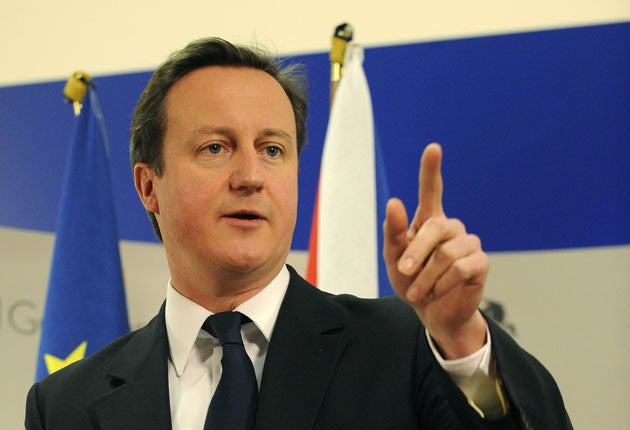Cameron angers EU allies with call to cut costs

David Cameron provoked a backlash from smaller European Union countries last night by proposing a tight cap on European Union spending until 2020.
Although he won the backing of France, Germany, the Netherlands and Finland, the Prime Minister was accused of "grandstanding" by eastern European nations who are normally seen as Britain's natural allies. Labour accused him of pandering to Tory Eurosceptics.
At a two-day summit of EU leaders in Brussels, Mr Cameron launched a pre-emptive strike ahead of what will be fraught negotiations next year on the 27-member bloc's budget for 2014-2020. He called for spending to rise by less than 2.9 per cent in 2012 and 2013 and then for the annual rise to be limited to no more than inflation until 2020.
A round-robin letter to be published today will say that nation governments are making "extraordinary efforts" to reduce their deficits, adding: "The EU cannot be exempt."
The Prime Minister told a press conference at the end of the summit that the letter would put down "a firm marker" for the budget talks. Describing the statement as "incredibly significant" and a "huge achievement", he said: "This is Britain, France and Germany – the three biggest countries in the EU – standing together united on the need for stopping the EU budget getting out of control."
He denied reaching a "backroom deal" with Nicolas Sarkozy, the French President, under which France would support the rebate on Britain's EU contributions and the UK would support the Common Agricultural Policy, which brings huge benefits to French farmers.
But Mr Cameron's initiative angered the European Commission, which normally takes the lead in the negotiations. One diplomat dismissed it as "a ritual dance before the main performance".
Some EU officials claimed that Germany only backed the plan in principle and might agree to a 1 per cent real terms rise. One source said:"This is nothing more than a classic game of taking a position ahead of a long negotiation. The letter is not binding in any way. There will be questions about the British rebate." Another diplomat claimed: "The letter is pretty meaningless. What matters is what happens in the negotiations next year. It will be forgotten by then."
Eastern European countries,which receive more from the EU's £107bn-a-year pot than they pay in, fear the proposed curbs would jeopardise EU grants to their poor areas. They pointedly refused to sign up to the letter.
"We do not agree with this attitude," said Petr Necas, the Czech Prime Minister. Mikolaj Dowgielewicz, Poland's Minister for Europe, said: "I don't think it is necessary, useful or shows Europe's ambition." Borut Pahor, Prime Minister of Slovenia, said his country would not sign the letter unless it had a guarantee that its cohesion funds for poor regions would not be cut.
Mats Persson, director of the Open Europe think-tank, said: "A cash freeze on the EU's long-term budget without reforming its actual substance could well prove a strategic mistake by David Cameron. Such a deal would serve to antagonise the new member states that stand to lose the most and represent a missed opportunity to re-negotiate the EU's flawed subsidy schemes, at a time when the UK has some leverage."
Yvette Cooper, the shadow Foreign Secretary, said: "David Cameron is desperately trying to appear tough in front of his Eurosceptic backbenchers at home, but is failing to appease them. He has offered nothing of substance other than agreeing to give more money to the EU."
Mr Cameron said he had won a "clear and unanimous agreement" that Britain would not be "dragged into bailing out the eurozone" as part of a new stability mechanism to be introduced in 2013. The UK would still be part of the existing emergency mechanism until then, but that had been a commitment entered into by the former Labour government and "we have to live with it", he said.
Join our commenting forum
Join thought-provoking conversations, follow other Independent readers and see their replies
Comments
Bookmark popover
Removed from bookmarks